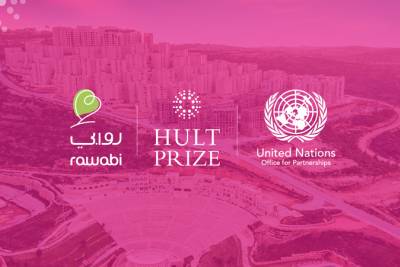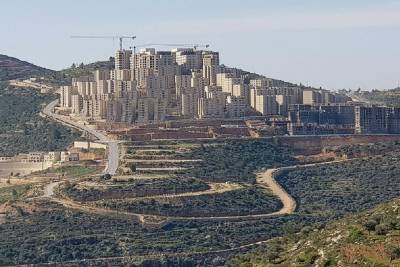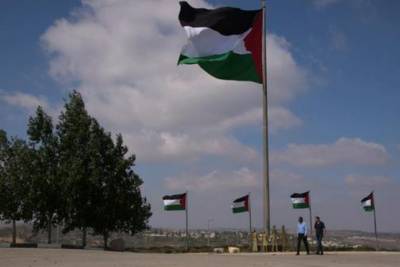Bumpy road in bid for landmark new Palestinian city
AFP - Palestinian businessman Bashar al-Masri knew that building Rawabi, which aims to be the West Bank's newest city, wasn't going to be an easy project.
But he never imagined it would take three long years to win Israeli approval for a single road of no more than a few kilometres (miles).
"It should be a straightforward process, but when you deal with politics, you never know what might happen," he told AFP in his office in Ramallah, his eyes glued to a live feed from the nearby construction site.
This month, work on the road will finally begin. And once complete, around 100 trucks a day will travel along it, bypassing the narrow village road that until now served as the only access to the construction site.
But the hard-won approval is only for a temporary road, and could be rescinded at any time, illustrating the unique challenges facing Masri's ambitious project -- which is about much more than real estate.
The businessman, who lived overseas for many years and holds US citizenship, envisages a model city that attracts employers and allows people to work where they live.
"There are so many complications. The road is temporary, we have to apply for its renewal every year, they could stop it at any time," he says.
But Masri is optimistic that the project, which is likely to cost in the region of $1 billion, will be both profitable and politically beneficial.
He also believes the city will be a model for a way the Palestinians can stake a claim to their land and curb the expansion of Israeli settlements that dot the West Bank.
"It's a ticking time bomb and I think the Palestinians have made a mistake by not creating facts on their land."
But attitudes are now changing, says Masri, a tall, thin energetic man in his 50s who speaks clipped English peppered with Americanisms but is perfectly comfortable in his native Palestinian Arabic.
"Hopefully with Rawabi it's just one more step in that direction."
At the construction site, the attitude is full speed ahead, despite the setbacks that have thrown the project's timeline and initial cost estimates out.
Tractors adorned with Palestinian flags trundle around the 210-acre (85-hectare) plot, which commands views of verdant olive groves and hills dotted with small villages whose mosque minarets spike the skyline.
At base camp, a cluster of smart trailers looks out over the project, where enthusiastic young men and women talk to prospective buyers, some of the 25,000-30,000 people who may one day call Rawabi home.
They show off slick slide-shows and attractive models of units that go for between $80,000 to $140,000 (60,000- 106,000 euros) and have garnered interest from buyers across the West Bank and abroad.
If successful, he imagines placing similar cities by major West Bank towns, stemming the exodus of their educated middle-class residents to Ramallah.
"I don't have a problem in terms of real estate. I could even increase the price a little bit and I would still sell what I have," he says.
"But my vision is to create a standalone city, and in doing that I have to create jobs... If the vision works, if the concept works, you can take Rawabi and put it next to Jenin, Qalqilya, Bethlehem."
Masri, who moved back in the mid-1990s, also wants Rawabi to set new green standards, and expects it to boast a commercial centre with infrastructure advanced enough to cater to the most high-tech firms.
"I believe since we're building a nation practically from scratch, we have the opportunity of building a modern nation," he says.
"Instead of privatising, we have the chance to create new cities... we have a chance to teach people to be more environmentally friendly."
Not everyone appreciates his vision, with some Palestinians claiming the project looks too much like an Israeli settlement, others angry that Rawabi's homes will be unaffordable to many.
But Masri is unapologetic about his vision, and says housing for low-income families will come later.
Interest from buyers suggests his critics are outnumbered, with more than 7,500 families having already prequalified to buy a home, he says.
And both the Palestinian government and the international community have lauded the project, though Masri laments that their vocal support has yet to be translated into funding for municipal infrastructure.
"Our government is bankrupt and relying on donors," he says, noting that foreign governments and institutions are happy to praise the project without contributing funds.
"If every time they said to me 'It's a beautiful project, you're doing a great job,' I would get a dollar, I would have paid for the whole thing," he laughs.
Donors, Masri says, are reluctant to be seen funding a private project, but he expects money will start arriving once Rawabi is inhabited and gains municipality status.
"But we will be at the tail end of our project then," he says.
Masri is realistic about the obstacles to its completion.
"We have daily problems with the Israelis, just like everyone else in the Palestinian private sector," he says, describing delays ranging from hours to days caused by one checkpoint on the road to Rawabi.
"The checkpoint is not against Rawabi, it's against the Palestinian people, period," he said.
To view original article, Click Here.



